In the spring, at the end of the day you should smell like dirt.
Margaret Atwood
I have tasted victory – and it was delicious!
Today, I am celebrating! It is a small but sweet victory. I harvested my first broccoli this morning and it was perfect. I should be clear; this was not my first broccoli of the season. It is the first time in the many years that I have tried it, that it has made it to maturity with more than a couple of sad florets. I have had ‘successful’ gardens for more than 20 years. I have tried broccoli in at least 5 of those. I have harvested once. Today. True it was only enough for two meals but it looks promising for at least one more round.
Stick-to-it-ivness and experimentation in the garden do pay off. Sometimes. Which got me thinking of a few of the many, many lessons I have learned from the garden.
The naked earth is warm with Spring,
And with green grass and bursting trees
Leans to the sun’s kiss glorying,
And quivers in the sunny breeze.
Julian Grenfell
No winter lasts forever; no spring skips its turn.
Hal Borland
Gardening simply does not allow one to be mentally old, because too many hopes and dreams are yet to be realized.
Allan Armitage
Everything that slows us down and forces patience, everything that sets us back into the slow circles of nature, is a help. Gardening is an instrument of grace.
May Sarton
Everything happens in its own time
Spring will eventually arrive. Fruit and vegetable will ripen in their own time and the best you can do is help them along or extend their season a little (with seed starting, a greenhouse or cold frames, for example). A plant needs a certain number of days to mature. Period.
When it is time to harvest, there is usually a relatively small window when that must be done. Harvest too soon and the fruit may not ripen; wait just a little too long and you could lose it to over-ripening, bolting or wildlife. We have been thwarted by deer on more than one occasion. In our yard, we have grapes growing around a pergola. We have had mature plants for maybe 5 years – and were able to enjoy the grapes in three of them, and the leaves only twice – and the leaves will get two growths. In our first few seasons, it was the same story. We would test the grapes daily as the neared maturity. Then declare that they were ready for harvest the next day (after our first experience, we made the declaration very quietly in the house. This did not help). And the next day, the plants would be picked clean. In the case of spring leaves for stuffed grape leaves, the deer cleared all the ready-to-pick leaves — and left the perfect young grape bunches to mature – so they would be more tasty for their next raid.
When you do successfully, harvest you will want to preserve (if you garden, you will need to embrace preserving too – dehydrating, canning, freezing, soup making). Since most preservation methods work best with fruit and vegetables at their peak, you must be ready to spend some time “putting up” your harvest, not always on your preferred schedule.
All of this to say, gardening teaches you patience. You must recognize and accept the natural order of the changing seasons, the sometimes too slow rates of growth, and the benefits of going with the flow.
Give in to the natural order.
You are NOT in control
Some gardeners battle the elements and try to beat back native plants or rid their patch of all pests. You will save yourself some heartache if you accept that there are battles you will not win. There will be pests and storms and dry seasons along with the sunshine and welcome rains. I have long believed that the garden succeeds or doesn’t, largely inspite of anything that I might do.
More and more, I am learning to follow natural patterns and be more aware of traditional ways. Letting native plants thrive in some areas is easier, encourages greater biodiversity, and supports pollinators. Planting with regard to good companions and natural pest deterrents can improve yield. There are many benefits to less tilling and more attention to composting and the needs of your soil. Observation is key. Take the time to watch patterns in your own area and incorporate new behaviours into your gardening. For the past few season, we have left a good portion of our yard go wild. It means less mowing and fuss about a ‘perfect lawn’ We have noticed an increase in biodiversity. The increase in pollinators has been great for our flowering plants, production on plants like squash has improved. Plus I love the way it looks. We have changing colour AND i get to harvest more wild plants for preserves or dyeing.
Learning to work with what we have has made life so much easier. Encourage what wants to stay – let the rest go away. That has been my motto for a while now.
Jenni Blackmore, owner of Quackadoodle Farm in Seaforth Nova Scotia and author of Permaculture for the Rest of Us: Abundant Living on Less than an Acre
Optimism is essential
Each year we enthusiastically plan a new garden and all its possibilities. Seed catalogues arrive in the middle of winter and we pour over them during snow storms. We forget the hardbreak and hard work and back aches of the previous season, choosing to focus instead on the dreams of new growth. We plan layouts and order new varieties and old favourites. We plant the tiny seeds and nurture them through the cold months, waiting less-than-patiently for the soil to warm enough for spring planting. We believe in the miracle that the seeds have all they need to become a prize-winning pumpkin or a delicate bloom. Despite the challenges, we believe the garden will continue to offer its bounties, to nurture us body and soul. For we know, without a doubt, that there is no greater joy, no finer reward, then a peaceful flower garden or a fruitful food one.
To garden is to let optimism get the better of judgment. – Eleanor Perenyini
Good things come from hard work
Woe to anyone who thinks gardening is easy. Many new gardeners are of the mistaken belief that it is simple; you plant the seeds, water (somewhat) regularly, and wait for harvest. But a seasoned gardener knows that it takes time and hard work to make a garden. It is necessary to turn the soil, add compost and other amendments, tend to delicate and sometimes temperamental seedlings. And it doesn’t slow down once the seeds are established. There is weeding, watering, pruning, thinning, staking, more weeding, succession planting, more thinning – and did I mention weeding? There are times when I swear the weeds have reappeared in the far end of the bed before I have worked my way around to the beginning. Much of the garden work is hard and repetitive, but it can also be so therapudic, and SO rewarding. And we learn, again and again, that what is worth doing, is worth doing right.
Gardens are not made by singing ‘Oh, how beautiful,’ and sitting in the shade. –Rudyard Kipling, ‘The Glory of the Garden’ (1911)
Every failure brings you closer to success
Every season in the garden brings successes and failures. What variety of tomato will produce the most fruit in my conditions? Where did all these slugs come from? Why did this carrot not sprout when it did so well last year? When will it rain? When will it stop raining? What was I thinking? It’s an experiment that takes place over and over again to find the right formula, and often there is no right formula.
Documentation is important for trends but conditions change from year to year and what worked last year might not work this season or next.
There is no such thing as 100% success in gardening. You are dealing with nature, so there can be no guarantees. And even the most prolific and dedicated gardens will have long tales of difficult seasons and extreme events on their path. That makes the successes all the sweeter. The garden is sure to engrain the idea that every failure is just one step closer to success.
May Sarton
Embrace the unexpected
Celebrate the small wins
A garden, like life, is full of unexpected finds. A squash growing happily in the compost pile, a plant through dead bursting back to life in a blaze of colour, a wild patch of sweet alpine strawberries appearing as if by magic, or an envelope of unlabelled seeds growing into a forgotten favourite blossom from a past season. Wonder at these mysteries and enjoy. Some of the best moments in life are unplanned, and they often become our fondest memories.
You can plan ahead but the unexpected will happen and it’s not always a bad thing. Many things grow in the garden that were never sown there.
Thomas Fuller
All gardeners need to know when to accept something wonderful and unexpected.
Allen Lacey
Stop and smell the roses – or the lilacs, or primrose, or rosemary or …
Life can be busy as we hustle through our daily lives. But in the garden, you are inspired to slow down, appreciate the beauty. Admire the varied and vibrant colours of the flowers. Watch the industrious bees and butterflies and they flit from plant to plant. Marvel at the strength of the tiny humming birds. Listen to the sounds of the crickets chirping, the birds singing, and the leaves fluttering. Appreciate the gentle cooling breeze on a hot day or the relief of rain after a long dry spell. Catch the wafting scent of thyme or the unmistakable sweetness of lavender. Savour the taste of the snap pea or blackberry or ripe cherry tomato that you eat right off the plant.
Gardens say ‘Slow down, Look around you, Believe, Hope’.
Zoraida Rivera Morales
You’re only here for a short visit. Don’t hurry, don’t worry. And be sure to smell the flowers along the way.
Walter Hagen

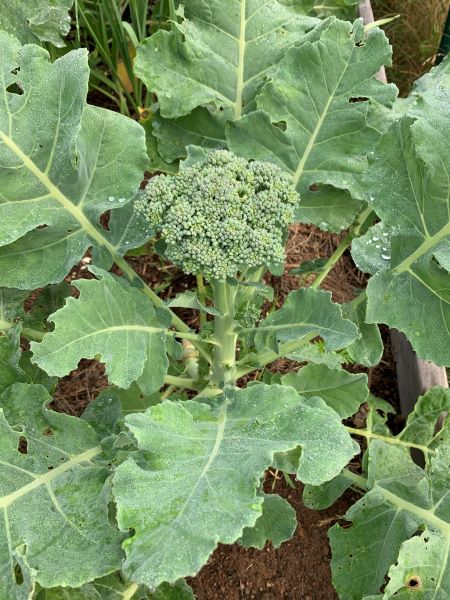
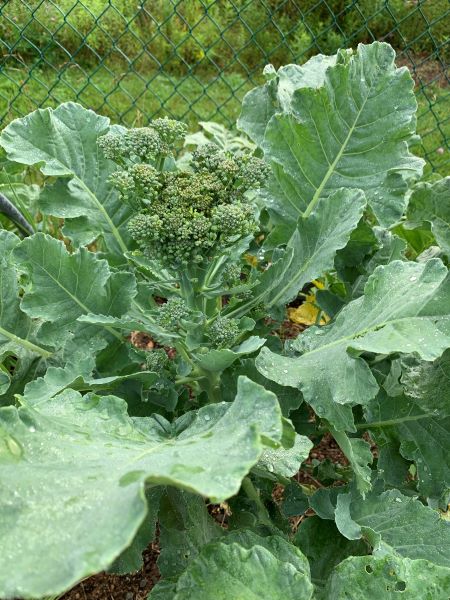
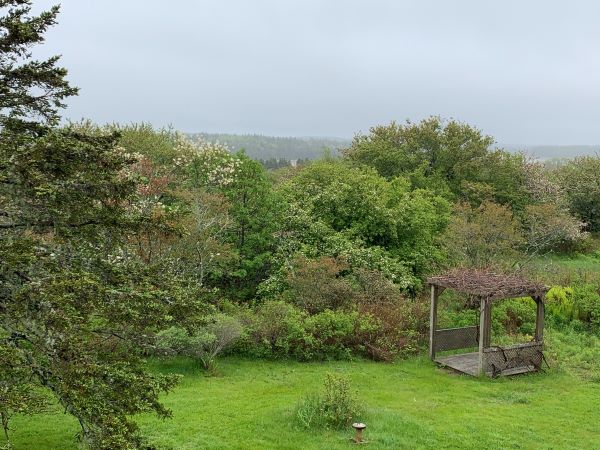
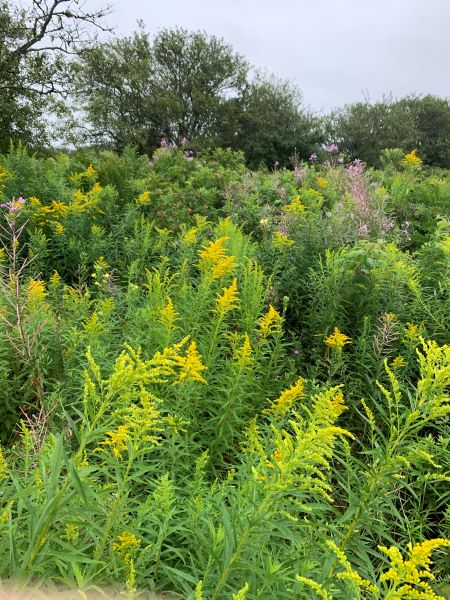
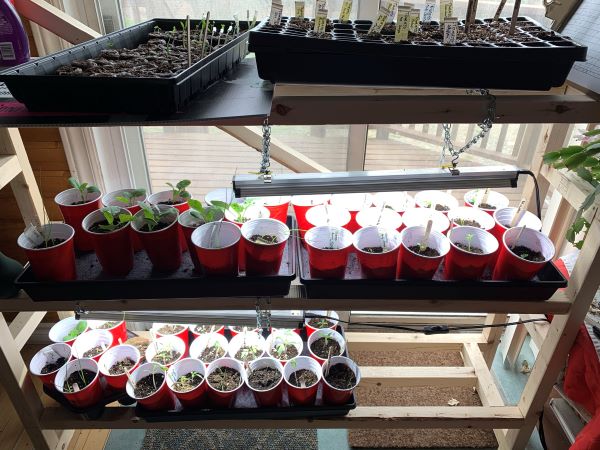
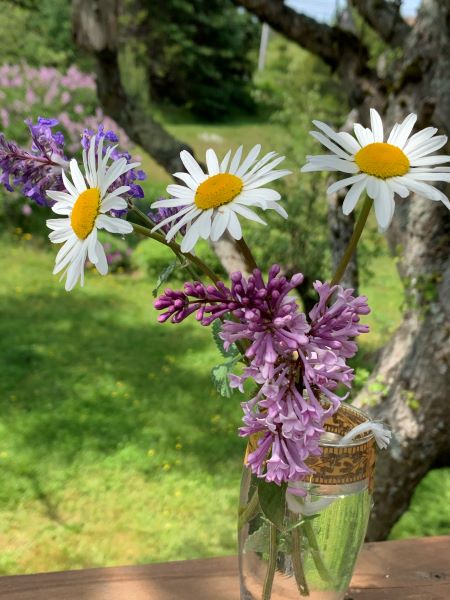

Congrats and you’ve taught me that even if I fail at Gardening its okay to try because it makes me happy. I can’t wait to tell my son we will be adding a Small Herb Garden to our Homeschooling.
I agree with you that gardening is rewarding even when it doesn`t go as planned. There is something therapeutic about the process too. I am sure that you will have fun with an herb garden with your son. He might also enjoy growing microgreens. Are you familiar with kidsgardening.org? Have fun. Happy growing.
So many congratulations! I love your photos, your writing, and your sublime appreciation of nature and gardening. Thank you for sharing, ME!
You are very kind, Laura. Thanks for the compliments – and for taking the time to comment.
How exciting that you picked your broccoli! I love bother vegetable and flower gardens and we have both. Whether we pick one or a basket full of vegetables, it’s so exciting to be harvesting something we grew! Lia loves helping in the garden also and then cooks the veggies!
Yes – the broccoli was a bit of a hurdle for sure. I have been focused mainly on food gardens for the past few years but this year have been paying more attention to the flower garden, with an emphasis on native plants and pollinator-friendly. You are absolutely right that it doesn’t matter how much you are harvesting. I am just delighted to get one snap pea or strawberry and eat it before it makes in the house. So fun to have Lia to work with you in the garden.
My gardening has usually been hydroponic- where I CAN control most of the elements.
Thanks for your comments. That would take away some of the challenge for sure. I haven’t tried hydroponic gardening and should look into that. Although I quite like digging in the dirt. 🙂
Congratulations! We had some broccoli planted in our last garden to no avail. LOL None of my gardens have been very successful — I don’t think I have the time to work hard enough for it right now. I remember my dad’s gardens — he worked really hard and we got a lot of food. I use that as my garden goal — one day I will achieve it!
Well, thank you – I was pretty pleased with my accomplishment (as if I had anything to do with it). Gardening does take a lot of time for sure but it is rewarding and centering. It sounds like you have a great inspiration in your dad’s gardens. I hope you reach your garden goal. Maybe you could start with some herbs or microgreens in the kitchen or a small tomato plant on a porch or balcony. Happy planting.